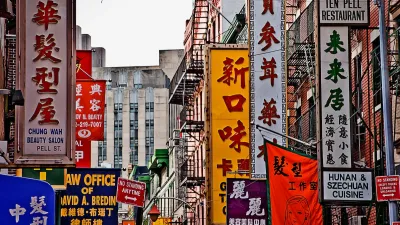Facing gentrification and skyrocketing property prices, business owners in New York's Chinatown are thinking about forming a Business Improvement District. Many say the plan would hurt small businesses.
"Many Chinese-Americans thought that through decades work and sacrifice, the poverty and racism that many had historically experienced would diminish. However, many residents now feel that the trauma of gentrification and rising rents, the loss of Chinatown's manufacturing and garment sector to outsourcing and continuing racism threaten to push the quality of life for Chinatown residents back to the 1870s when the community began."
"Wong's Restaurant Alliance is but one of many groups in a new coalition called the Coalition to Protect Chinatown and the Lower East Side. Gentrification and racism are long-term issues facing Chinatown residents, but recent attempts by the Chinatown Partnership and the Rebuild Chinatown Initiative to launch a business improvement district, or BID, have triggered a wave of activism and debate in the community."
"Business improvement districts are formed by property and business owners to improve commercial districts. They work by assessing all property owners in the district an additional 3 percent to 5 percent property tax, and then use these funds for privatized sanitation services - such as street cleaning and graffiti removal - security and other activities that owners would like to bring to the neighborhood, such as cultural programming."
"In order to win approval, more than 50 percent of the district's property owners must back the BID, but usually much more support is needed than that. Commercial landlords generally pass on the assessment to their commercial tenants, while residential co-ops usually have only a nominal fee, very often $1."
"The Chinatown Partnership, a major advocate for a local BID, currently runs programs like a Taste of Chinatown and a clean-streets initiative, and it believes that without the resources from BID assessments, these beneficial programs would be forced to close."
"But the proposal has angered residents such as Lee and Wong, who believe the property-tax increase would push small business owners - barely hanging on already - over the edge, and out of Chinatown."
FULL STORY: BID battle brews amid a changing Chinatown

Alabama: Trump Terminates Settlements for Black Communities Harmed By Raw Sewage
Trump deemed the landmark civil rights agreement “illegal DEI and environmental justice policy.”

Planetizen Federal Action Tracker
A weekly monitor of how Trump’s orders and actions are impacting planners and planning in America.

The 120 Year Old Tiny Home Villages That Sheltered San Francisco’s Earthquake Refugees
More than a century ago, San Francisco mobilized to house thousands of residents displaced by the 1906 earthquake. Could their strategy offer a model for the present?

In Both Crashes and Crime, Public Transportation is Far Safer than Driving
Contrary to popular assumptions, public transportation has far lower crash and crime rates than automobile travel. For safer communities, improve and encourage transit travel.

Report: Zoning Reforms Should Complement Nashville’s Ambitious Transit Plan
Without reform, restrictive zoning codes will limit the impact of the city’s planned transit expansion and could exclude some of the residents who depend on transit the most.

Judge Orders Release of Frozen IRA, IIJA Funding
The decision is a victory for environmental groups who charged that freezing funds for critical infrastructure and disaster response programs caused “real and irreparable harm” to communities.
Urban Design for Planners 1: Software Tools
This six-course series explores essential urban design concepts using open source software and equips planners with the tools they need to participate fully in the urban design process.
Planning for Universal Design
Learn the tools for implementing Universal Design in planning regulations.
Clanton & Associates, Inc.
Jessamine County Fiscal Court
Institute for Housing and Urban Development Studies (IHS)
City of Grandview
Harvard GSD Executive Education
Toledo-Lucas County Plan Commissions
Salt Lake City
NYU Wagner Graduate School of Public Service



























